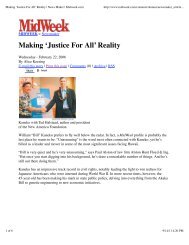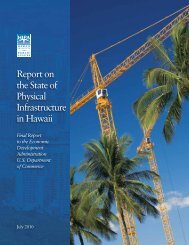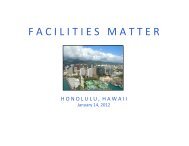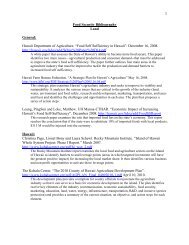Hawai'i Fisheries Initiative - The Hawaii Institute for Public Affairs
Hawai'i Fisheries Initiative - The Hawaii Institute for Public Affairs
Hawai'i Fisheries Initiative - The Hawaii Institute for Public Affairs
You also want an ePaper? Increase the reach of your titles
YUMPU automatically turns print PDFs into web optimized ePapers that Google loves.
transit) by <strong>for</strong>eign ships through a nation’s<br />
territorial sea. Beyond the territorial sea<br />
were the high seas, virtually a free-<strong>for</strong>-all of<br />
international activity. 348<br />
In 1945, on the heels of World War II and<br />
the resulting awareness that a nation’s<br />
oil and gas reserves were a significant<br />
source of wealth and power, President<br />
Truman issued a proclamation that claimed<br />
U.S. control and jurisdiction over the<br />
resources of the continental shelves off<br />
the U.S. coast (the target being the oil-rich<br />
seabeds). At the time, this was likely an<br />
illegal act, as the U.S. was asserting its<br />
authority well beyond the previously<br />
established customary 3 nm territorial<br />
seas limit. However, other nations quickly<br />
followed suit, and within 10 years, there<br />
was widespread general acceptance and<br />
approval – mainly through other nations<br />
claiming sovereign rights to their own<br />
continental shelves. 349 <strong>The</strong> Truman Proclamation,<br />
also known as the Continental<br />
Shelf Doctrine, thus became an accepted<br />
international custom that recognized coastal<br />
nations’ sovereign rights in the natural<br />
resources of the seabed and subsoil of the<br />
continental shelves. 350<br />
Facing the Japanese return to offshore<br />
whaling grounds following World War II,<br />
Chile, Ecuador, and Peru became the first<br />
nations to extend their claims out to 200<br />
nautical miles from shore, although this<br />
was not greeted with the same level of<br />
acceptance as the Truman Proclamation,<br />
generally because of the limiting effects on<br />
the fishing fleets and navies of powerful<br />
seafaring nations like the United States. 351<br />
73







